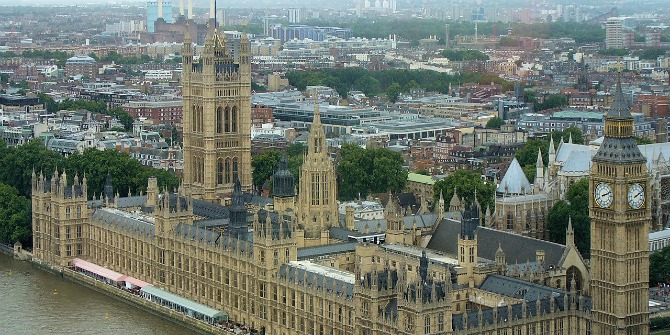 Recent changes suggest that the UK is strengthening the enforcement of its anti-bribery laws. But how did the policy develop? Ellen Gutterman explains that the policy was framed around four key contexts over the past two decades, each of which affected its scope. She argues that the fourth context – terrorism – even though expedient, did not necessarily ensure compliance.
Recent changes suggest that the UK is strengthening the enforcement of its anti-bribery laws. But how did the policy develop? Ellen Gutterman explains that the policy was framed around four key contexts over the past two decades, each of which affected its scope. She argues that the fourth context – terrorism – even though expedient, did not necessarily ensure compliance.
The UK recently has been stepping up its anti-corruption enforcement. The Bribery Act of 2010 is among the most stringent national laws aiming to control bribery and corruption in the global economy. In 2015, government introduced a new International Corruption Unit to investigate cases of international corruption in developing countries. Earlier in 2017, Rolls Royce agreed to pay £671 million in penalties to settle long-running corruption allegations having to with systematic bribery over three decades and across 13 countries.
The UK was a laggard on anti-bribery
This enforcement activity is new. Observers of UK anti-bribery policy might recall that, for over a decade, the United Kingdom failed to uphold its international legal commitments to control the supply-side of transnational bribery. In 1997 the UK agreed, alongside its partners in the Organization for Economic Cooperation and Development (OECD), on a binding international convention to criminalize the bribery of foreign public officials in international business transactions and to participate in peer review processes to monitor and enforce compliance.
Yet OECD peer reviewers recurrently found UK anti-bribery law deficient. The OECD’s Working Group on International Bribery (Working Group), the NGO Transparency International, and the UK’s sovereign allies sharply criticized the UK for inadequate implementation and enforcement of the anti-bribery convention. The OECD repeatedly urged the UK to “enact appropriate legislation and to do so as a matter of priority.”
In a recent paper, I identify and illustrate the impact of policy framing on UK anti-bribery policy in the years following the UK’s international commitment to criminalize transnational business bribery. Framing is the strategic marshalling of key rhetorical tools to create support for normative ideas – a central task of advocacy aiming at state adoption of preferred policies. Frame analysis has animated important research across the social sciences, including notable studies in public policy, international relations and other areas.
My research shows how proponents and opponents offered alternative policy frames through which to consider new anti-bribery rules in the UK. Some of these (poverty reduction, domestic anti-corruption reform) were in low priority contexts that did not engage government attention, leading to inaction and non-compliance. Other frames (strategic trade competition, anti-terrorism) were in high priority policy contexts, which did engage the government – first to inaction, and then, finally, to criminalize transnational bribery as part of the UK’s post-9/11 emergency anti-terrorism legislation in 2001.
The research reveals, however, that even the expedient frame – terrorism – was not conducive to full compliance in this case. The lesson for anti-corruption campaigners is that they need to be canny in choosing high-priority policy contexts in which to frame advocacy for different audiences. They also need to be aware of the trade-offs between expediency and nuanced compliance.
Framing corruption: the importance of policy context
Corruption first ‘erupted’ as a global policy problem in the 1990s. Like many transnational issues, bribery and corruption can be addressed through a variety of policy contexts. For example, multiple anti-corruption initiatives have arisen as a way to promote free markets and fair competition in international business; monitor and support transition economies and democratization; implement international development policies and promote the effectiveness of foreign aid; promote corporate social responsibility, ethical business practices, and the regulation of multinational corporations; and, after 2001, control terrorist financing, transnational crime, and the illicit global economy.
The challenge for anti-corruption advocates seeking a strong frame is to identify which of these policy contexts is of highest priority to a given target audience. In the UK, proponents and opponents of rules against transnational bribery framed their advocacy in four different policy contexts:
International development and poverty reduction
First, the Department for International Development under Clare Short and Transparency International framed anti-corruption as a component of the government’s international development and poverty reduction policy. However, the department’s White Papers received practically no parliamentary attention. International development policy and foreign aid remained particularly low-priority issues. Within this frame, the policy on international bribery and corruption – not to mention compliance with the OECD Convention – was sidelined.
Domestic anti-corruption reform
Second, the Home Office treated any legislative project in connection with the OECD anti-bribery convention as part of the government’s plan for a general reform of Britain’s domestic corruption laws. They suggested broad reforms including the consolidation of laws dating from 1889, 1906, and 1916, and the politically controversial topic of corruption among MPs – a matter that had been ignored in British politics for decades. These reforms were not only a very low priority for government, but also were only minimally connected with the OECD Convention’s requirement that signatories criminalize transnational bribery.
Strategic trade competition
Third, business and industry leaders framed new anti-bribery rules in the context of strategic trade competition. In this frame, the Confederation of British Industries (CBI) argued that “by legislating more strictly than other countries U.K. companies risk being hindered in their daily operations in countries where corruption is perceived to be endemic.” In other words, new anti-bribery rules would hamper the competitiveness of UK firms abroad. For the government’s Defense Exports Services Organisation within the Ministry of Defense, in particular, this was a powerful frame, affecting important resource extraction operations and arms exports – lucrative, highly dependent on foreign sales, and known to be rife with corruption. This frame promoted non-compliance with the OECD Convention.
Terrorism
Finally, following the terrorist attacks of September 11, 2001, anti-bribery proponents pounced on a new policy context: emergency anti-terrorism legislation. In this new frame, Home Secretary David Blunkett said that corruption “contributes to the conditions which breed terrorism” and that efforts to fight corruption were a “vital adjunct to military action.” Suddenly the UK’s “lamentable” foot-dragging on the Convention changed: “it took September 11 to make it happen.” The Anti-Terrorism, Crime and Security Act, including three clauses on bribery and corruption, swiftly passed through Parliament.
Uncertainty and lack of enforcement
Even with passage of the anti-terrorism Act, however, questions remained about whether it met the requirements of the UK’s international commitments on transnational bribery. Critics called the legislation piecemeal, weak, and only minimally in compliance with the OECD convention. UK corporations with overseas operations continued to oppose strict anti-bribery rules within the Export Credits Guarantee Department. In 2004 the Minister of Trade diluted anti-bribery restrictions on UK exporters receiving government support. In 2006 the government stopped a Serious Fraud Office (SFO) investigation into bribery allegations surrounding BAE Systems’ Al-Yammamah arms contract with Saudi Arabia. Government adopted comprehensive anti-bribery legislation in 2010 – but for years prosecuted not a single important case under it.
What’s next?
Is the UK now entering a new era of anti-bribery enforcement? On one hand, a new International Corruption Unit is in place. Serious investigations are under way. Government has started issuing Deferred Prosecution Agreements (DPAs) to companies who self-report bribery and corruption violations. Yet at the same time, UK anti-corruption campaigners remain skeptical: DPAs may be a way to let companies off the hook. As for framing, Transparency International’s recent research refreshes the terrorism and security frame. What this means for UK anti-corruption enforcement remains to be seen.
_____
Note: this article draws on the author’s published paper in The British Journal of Politics and International Relations.
 Ellen Gutterman is an Associate Professor in the Department of Political Science at Glendon College, York University, Toronto. For a full list of publications see here.
Ellen Gutterman is an Associate Professor in the Department of Political Science at Glendon College, York University, Toronto. For a full list of publications see here.









Yet another nasty example of the democratic deficit between the interests of the public – the voters – and the preoccupation of the political classes with ‘the economy’ and ‘business’ as ends in their own right.
George Monboit exposed links to how Neo-Liberalism has become a world wide phenomena, within these links is information about the organisations deliberately producing fake information and the setting up bogus institutes that justify their propaganda.
Corruption and misinformation are the hallmarks of the capitalist system that is how a tiny elite has maintained power, it really is for decent to people to stand out against it and highlight it in all it’s forms.
https://www.theguardian.com/commentisfree/2017/feb/02/corporate-dark-money-power-atlantic-lobbyists-brexit
Agree 100%. My own, less polite comment, was moderated …